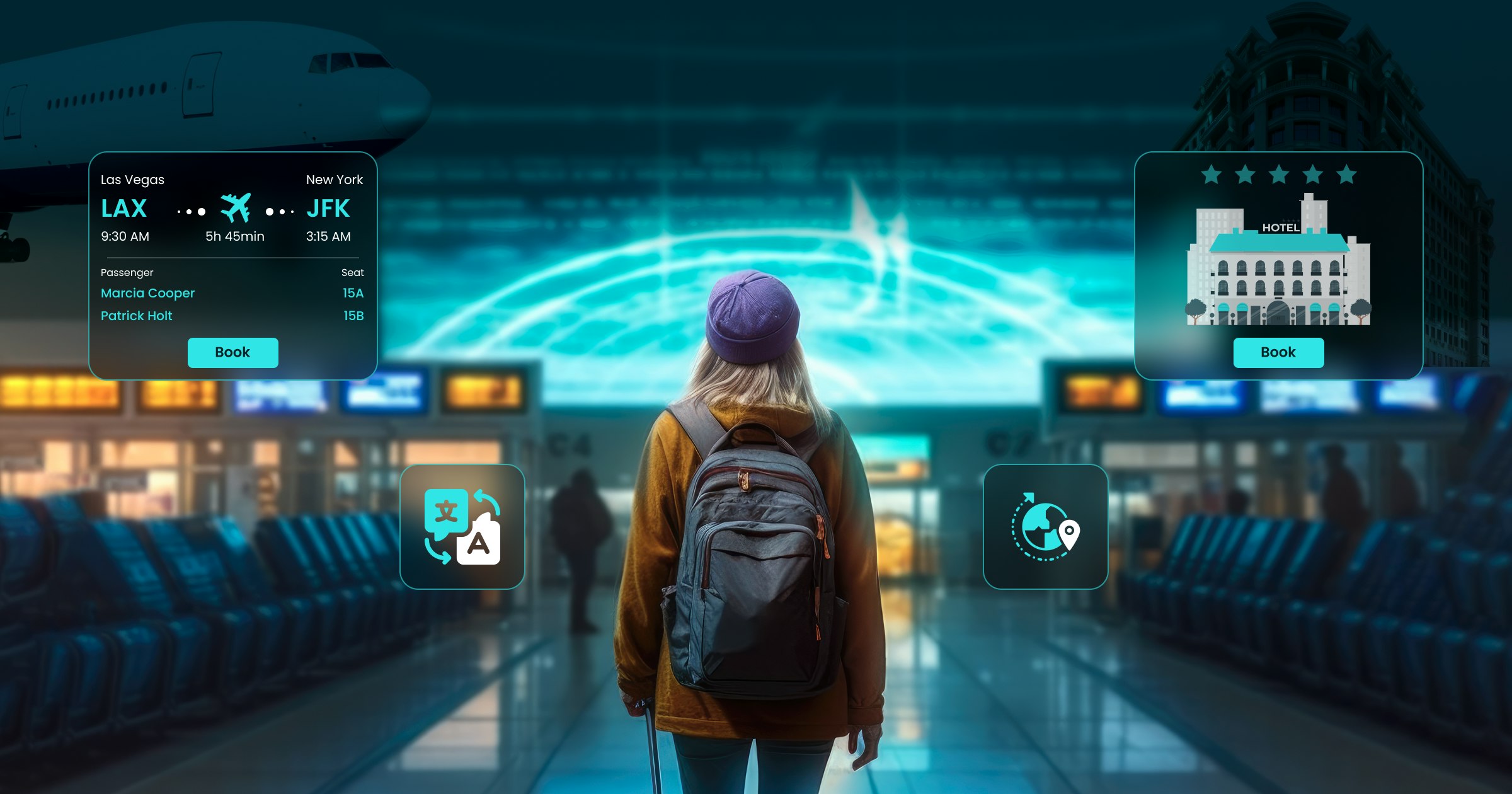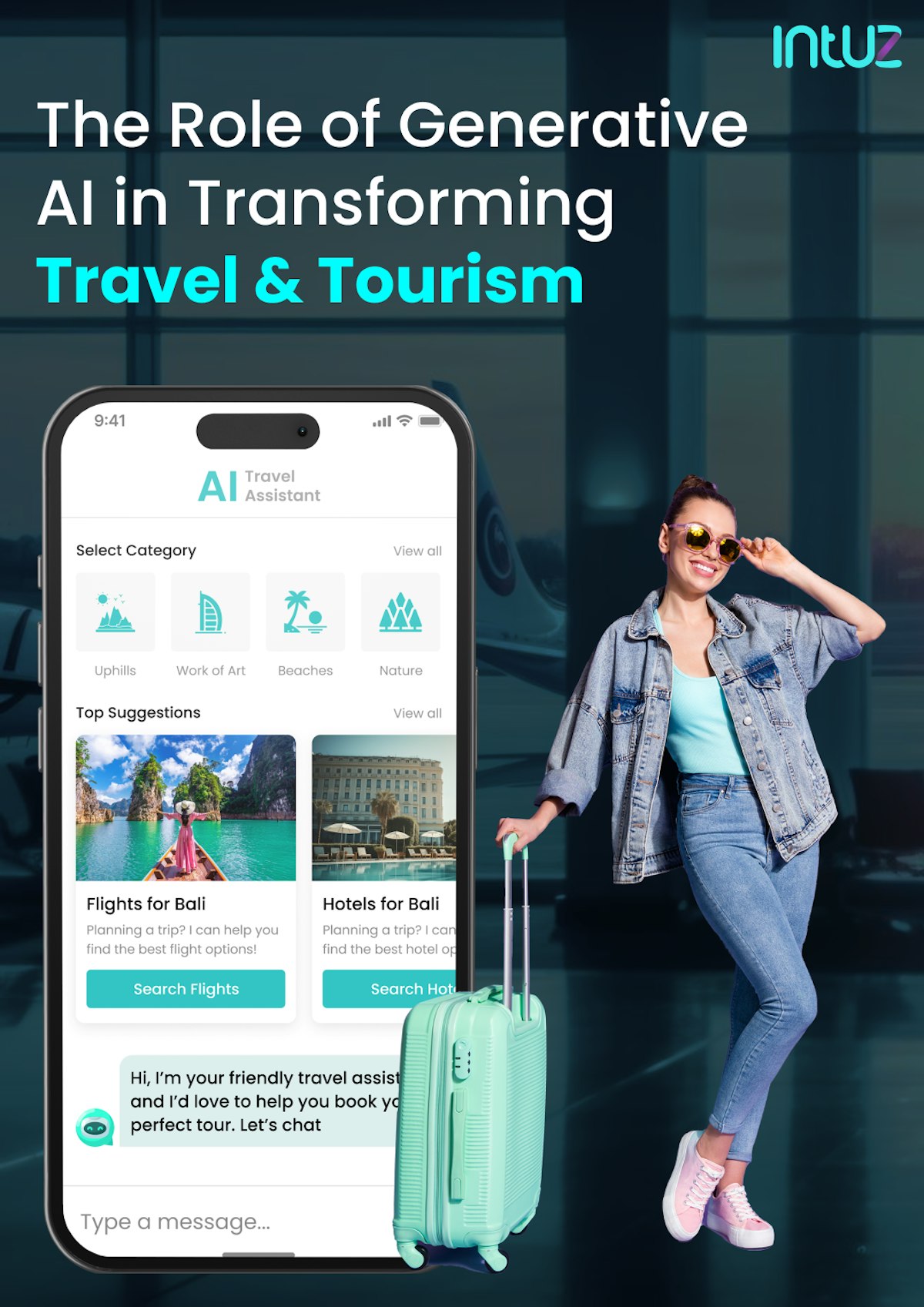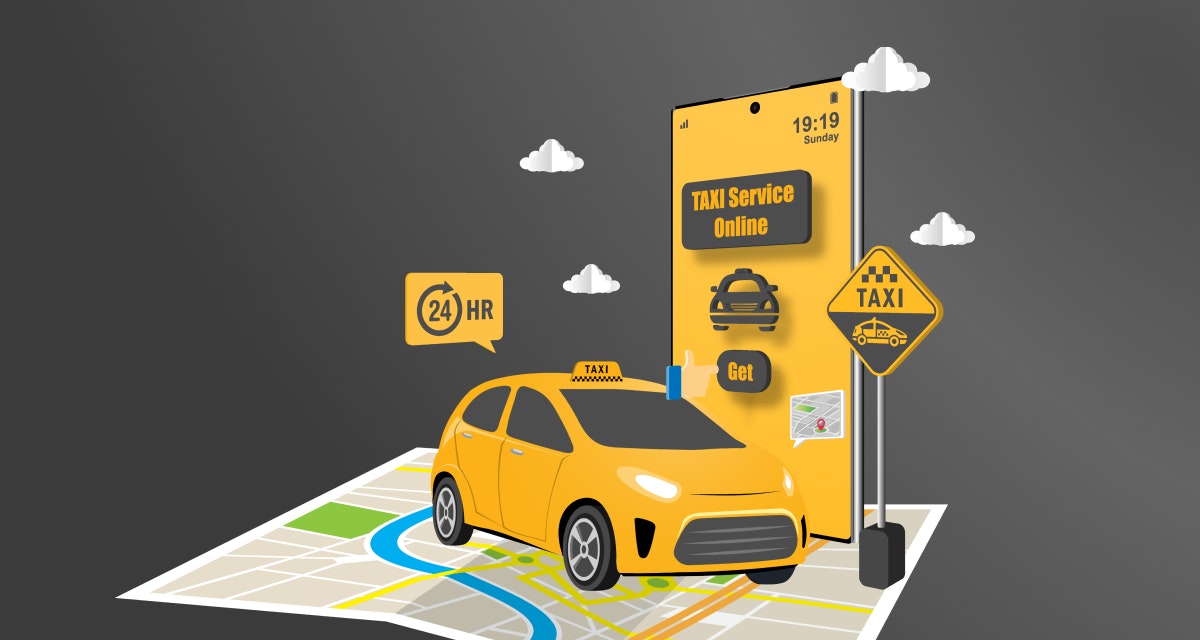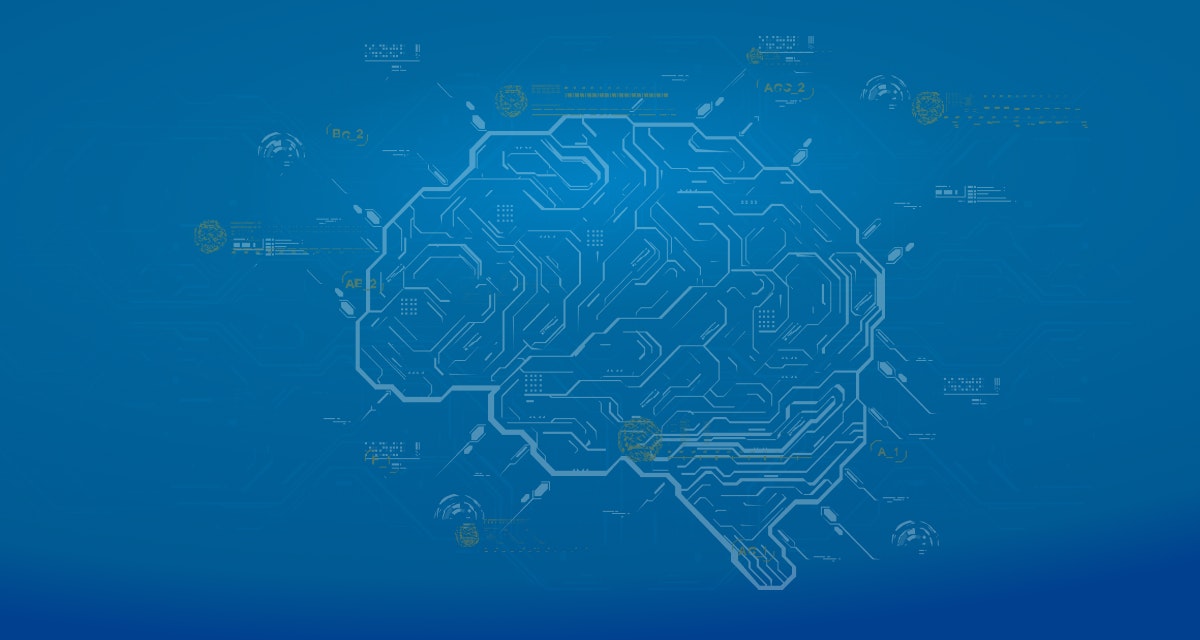Table of Content
The future of travel is all set to get a new makeover, and at the heart of this transformation lies AI, or Artificial Intelligence. Humans have always sought different ways to make travel convenient, faster, and enjoyable for them.
Fortunately, with AI making grounds in every global industry, the travel industry also seems to benefit from AI, making travel efficient and exciting for you.
In this blog, we will cover some basic concepts of AI in travel and showcase how AI is transforming the future of travel. Let us begin!
What is AI in Travel?
AI in travel refers to integrating AI technologies and solutions within the travel and tourism industry. Leveraging AI in travel, users can personalize trip planning, streamline the hotel booking process, and enhance in-travel experiences.
Additionally, AI plays a vital role in air travel safety. AI-provided solutions address health and safety concerns through contactless solutions and aid in disease outbreak predictions.
According to a report by Mordor Intelligence, the global AI in the travel market is projected to reach $8.01 billion by 2027, growing at a CAGR of 19.7% during the forecast period of 2022-2027.
One of the most significant applications of AI in travel is personalization. By analyzing vast data, AI algorithms can understand individual preferences, past behaviors, and travel patterns, enabling tailored recommendations for flights, hotels, and activities. Companies like Expedia and Airbnb are leveraging AI to provide personalized experiences, leading to increased customer satisfaction and loyalty.
Integrating AI in travel will surely make travel more efficient, personalized, and secure, significantly transforming how we explore the world.
AI impact on the travel and tourism industry
AI is transforming the travel industry through personalized recommendations, operational efficiencies, and enhanced experiences. From AI chatbots assisting with bookings to predictive analytics optimizing pricing and inventory, AI streamlines processes. Virtual assistants curate tailored itineraries, while AI translation breaks language barriers. As AI evolves, travel will become more seamless, sustainable, and personalized.
Today, travelers increasingly rely on smartphones for trip planning, with approximately $798 billion worth of bookings made through digital mediums in 2022 globally.
This digital shift has enabled users to use self-service technology instead of traditional methods for their travel preparations and journeys.
Now, as AI is incorporated into the travel industry, digital solutions designed for travel have become more efficient and reliable.
Upon researching the behavior of users while planning a trip, we came across the following statistics:
- Over 73% of users use smartphones and other digital services to book flights and hotels.
- Nearly 85% of consumers rely on digital resources to decide their trip activities upon reaching their destinations.
Having said that, as AI technologies advance further, the industry will witness several innovations that elevate the travel journey and experience for all.
A Leading AI Development Services Company
Explore nowAI innovation in travel - transformative role in reshaping journeys
AI is all set to transform the travel and tourism sector by aligning it with the digital age. Here is how AI is enhancing planning, booking, and in-travel experience for travelers.
1. Smart travel planning
Gone are the days when travelers spent hours searching for the best deals on flights, accommodations, and activities. Now, with AI-powered traveling tools, providing personalized travel recommendations tailored to individual preferences and budgets has become simple.
A. Optimized travel booking
AI algorithms can analyze vast amounts of data to find the best flight routes, hotel deals, and travel packages tailored to your preferences. By considering factors like budget, dates, and desired activities, AI can streamline the booking process, saving you time and money. A study by Phocuswright found that AI-powered travel bookings increased by 76% in 2022.
B. Personalized trip recommendations
AI tools can analyze traveler preferences, past behavior, and online activities. Based on the generated insights, AI tools can recommend destinations, accommodations, and activities based on individual interests. Tripadvisor's AI system increased user engagement with recommendations by 28%.
C. Dynamic price tracking
Dynamic price tracking helps consumers find the best deals and save money by monitoring real-time pricing changes. AI can continuously monitor airfares, hotel rates, and package deals, alerting you to the best prices and times to book. By analyzing historical data and predicting demand patterns, AI can help you snag the most cost-effective travel deals.
D. Flight forecasting
AI can predict flight delays and disruptions by analyzing real-time data on weather, air traffic, and airline operations. This allows airlines and travelers to proactively manage their schedules and minimize inconveniences
2. Enhanced in-travel experience
Once passengers are on the road, AI continues to enhance their experiences in ways that were previously unimaginable.
A. Smart baggage handling
Smart tagging and computer vision identify luggage, while machine learning optimizes routing for smoother transits. Delta Airlines saw a 25% reduction in mishandled bags after implementing an AI system that tracks bags and automatically reroutes them.
B. Language translation
AI has enabled the use of real-time translation, breaking down language barriers and promoting cultural exchange worldwide. It means that wherever you go, you can communicate with almost everyone.
AI translation tools like Google Lens instantly translate menus, signs, and conversations in over 100 languages. Moreover, Samsung's Bixby uses speech recognition and machine translation to enable real-time multi-lingual conversations.
C. Virtual tour guides
AI-driven augmented reality apps can turn your smartphone into a personal tour guide. You just need to position your camera at a landmark. Based on the captured results, the app will provide all the required information and even virtual tours of the place. Operators like Lufthansa use AI-generated avatars as virtual guides, providing interactive audio-visual experiences.
D. Cuisine exploration
AI recommends local restaurants and dishes based on your eating preferences. This helps you enjoy the best foods per your taste buds, enriching your travel experience. Apps like Tastewise use machine learning to analyze your preferences and local cuisine data, serving up personalized restaurant and dish recommendations.
3. AI and sustainability in travel
Sustainability is an important concern in the travel industry, and AI plays a crucial role in addressing these concerns.
A. Transportation optimization
AI-powered transportation optimization can significantly reduce carbon emissions. By analyzing data and optimizing routes, fuel consumption, and vehicle utilization, airlines and transportation companies can minimize their environmental impact. For instance, a study by IBM found that AI-driven route optimization can reduce emissions by up to 20%.
B. Sustainable accommodations
AI assists in identifying and promoting sustainable accommodations that prioritize energy efficiency, water conservation, and waste reduction. For example, Expedia's AI-based platform highlights eco-friendly hotels, encouraging travelers to make more sustainable choices. According to a report by Booking.com, 73% of travelers prefer eco-friendly accommodations.
C. Efficient air traffic management
AI-enabled air traffic management systems can optimize flight paths, reducing delays, fuel consumption, and emissions. The Federal Aviation Administration (FAA) estimates that its AI-powered traffic management system can reduce flight delays by 35%, translating to substantial fuel savings and lower emissions.
D. Improved Safety
Traveling becomes more sorted, streamlined, and safe with AI. AI-powered predictive maintenance detects potential issues in aircraft before they become big safety concerns. In the aviation industry, AI is used to monitor aircraft maintenance, detect anomalies, and predict potential failures, enhancing passenger safety while reducing the environmental impact of unplanned maintenance or incidents.
4. AI Travel safety solutions
Health safety in travel is of paramount importance, and AI-powered tools play a crucial role in ensuring safer journeys.
A. Effective health screening
AI can be used for non-invasive health screenings, such as temperature checks and symptom assessments, allowing for quick and efficient health monitoring at travel hubs. For instance, facial recognition combined with thermal imaging can identify individuals with elevated body temperatures, enabling proactive measures. According to a study by the World Health Organization, such solutions can reduce disease transmission by up to 70% in high-risk areas.
B. Predictive modeling
By analyzing vast amounts of data, AI can predict potential safety risks and provide recommendations to mitigate them. For example, machine learning algorithms can forecast natural disasters, political unrest, or crime patterns in specific destinations, allowing travelers to make informed decisions or reroute their plans accordingly.
C. Contactless check-ins
AI-powered facial recognition and touchless technology enable contactless check-ins at airports and hotels. This reduces the risk of virus transmission as people come in the least contact with one another.
Facial recognition, mobile apps, and voice assistants can streamline the check-in process, minimizing physical contact and crowding. According to a survey by the International Air Transport Association (IATA), 63% of travelers prefer contactless check-in options for improved safety.
D. Quick AI diagnostic check
A quick AI diagnostic check swiftly evaluates AI systems to check if all passengers are in healthy condition. These solutions can integrate with wearable devices or mobile apps, constantly monitoring vital signs and alerting users to potential health issues. A recent study by the Mayo Clinic found that AI-driven diagnostic checks can identify up to 90% of common travel-related illnesses accurately.
AI tools for travel & tourism
AI has already entered the sphere of traveling and is creating magical results for users leveraging AI-based apps. Here are a few popular AI use cases to consider:
1. AI-powered travel chatbots
These intelligent bots offer instant customer support to users and assist with hotel and flight bookings. They offer personalized travel recommendations, substantially enhancing user experiences while reducing response times for inquiries.
Companies like Expedia, KLM, and Kayak use AI chatbots to handle up to 60% of customer queries. These bots provide 24/7 service, answering FAQs on bookings, itineraries, delays, and more. KLM's BlueBot handles over 15,000 conversations per week in 16 languages. AI chatbots reduce wait times and enable personalized self-service.
2. AI personalization/recommendation engines
AI-driven personalization and recommendation engines analyze customer data to provide highly customized travel recommendations and offers. Companies like Airbnb and Booking.com use this to increase bookings and customer satisfaction. Gartner predicts these AI tools will boost travel company profits by over 10% by 2025.
3. AI baggage management
Handling tons of baggage at airports has always been challenging. However, as AI integrates into travel, baggage management has also evolved. You can now utilize predictive analysis and photo identification methods that store scanned images of your suitcase. It helps track your bag and greatly improves the reliability of baggage services for both airlines and travelers.
4. Flight forecasting apps
There are many flight forecasting apps based on AI that analyze real-time flight data, weather conditions, and other factors for users. It leverages ML algorithms to predict flight delays, cancellations, and optimal routes for the destination, providing travelers with up-to-date and accurate information. Apps like Freebird can automatically rebook passengers on optimal flights as soon as delays are forecasted. This proactive approach prevents long queues and keeps travel on track.
Popular Examples: Skyscanner, Kayak, and Expedia
5. Voice-activated virtual assistants
The speech recognition software solutions are a great way of connecting guests with hotel services. The voice-activated systems give users better room control, real-time weather updates, and hands-free communication. Major hotel brands like Marriott and Holiday Inn offer AI voice assistants in rooms to control TVs, order room service, make requests, and get local recommendations hands-free.
Another example: Siri and Alexa, used at Aloft Hotels and Wynn Resorts Las Vegas.
6. In-depth sentiment analysis
Text-based comments in various review websites undergo sentiment analysis that uses NLP and ML to study people’s opinions and ideas about specific tourism services and products. Travel-related businesses usually leverage such tools to transform the obtained information into a competitive advantage for their business.
Popular Examples: Qualaroo, HubSpot Service Hub, and MonkeyLearn
7. AI pricing and revenue management
Airlines and hotels apply AI/machine learning to intelligently analyze historical data and forecast models to optimize pricing and revenue management strategies. This allows them to dynamically adjust rates based on demand, competition, events, and other factors to maximize yields.
Future of AI in travel and tourism
The future of AI in travel and tourism promises a transformative impact, enhancing both operational efficiency and customer experience. AI-driven personalization will enable travel companies to offer highly customized itineraries, recommendations, and services tailored to individual preferences and behaviors. Advanced chatbots and virtual assistants will provide real-time support, handling inquiries and bookings seamlessly. Predictive analytics will optimize pricing, inventory management, and demand forecasting, ensuring competitive advantages. Additionally, AI-powered solutions will enhance safety and security, from biometric verification to anomaly detection, ensuring a smooth and secure travel experience for all.
Conclusion
It is visible that the future of AI in travel holds boundless innovations and possibilities. So, if you run a travel business, opting for an AI-based travel app can promise swift business growth, higher global reach, improved user convenience, and expanded clientage for your business. Enhance your travel business with ultimate technologies with Intuz.
If you're in the travel business or tour operator looking to revolutionize your services with generative AI, take the next step now!
Book Your Free 45-Minute Consultation with Our AI Experts Today!
During this exclusive, personalized session, you'll receive:
An assessment of your travel business's AI readiness and identify potential use cases
A detailed strategy and implementation roadmap for integrating AI-driven chatbots, virtual travel assistants, and recommendation engine
Insights into advanced AI algorithms for demand forecasting to better anticipate and meet customer needs





9c6f.png?w=1200&q=75&auto=format,compress&fm=png8)
